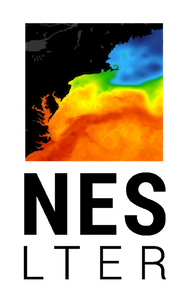 ©2020 Biological and Chemical Oceanography Data Management Office.
©2020 Biological and Chemical Oceanography Data Management Office.Funded by the U.S. National Science Foundation
Continuing Award OCE-2322676
Sep 2023 to Aug 2028 (estimated)
LTER: Scales of Variability in Ecosystem Dynamics and Production on the Changing Northeast U.S. Shelf (NES II)
NSF Award Abstract:
The Northeast U.S. Shelf (NES) is the region of the Northwest Atlantic Ocean that overlies the continental shelf from North Carolina to Maine. The NES has a long history of intense human utilization and provides an array of ecosystem services including shipping, recreation, conservation, and energy development. The NES also comprises a seasonally dynamic and productive ecosystem, supporting renowned fisheries, whose integrity is critical to the health of the Northeast U.S. economy. The NES ecosystem's productivity is fueled by planktonic organisms that interact with each other in complex food webs whose structure depends on environmental conditions (e.g., temperature, light, and nutrient levels). These conditions are rapidly changing because of climate-change-related warming and human utilization. For example, the NES is seeing the largest development of coastal wind farms in the U.S. to date. Phase II of the Northeast U.S. Shelf Long-Term Ecological Research program (NES-LTER II) advances our ability to predict how anthropogenic impacts will affect the dynamics of the shelf's planktonic food webs and their ability to support the productivity of higher trophic levels, from fish to whales and humans. Because the NES is subject to long-term challenges that will impact many people, the project emphasizes an active education component for helping to train the next generation of marine scientists and outreach activities to increase public understanding of marine science and technology. The project team conducts education and outreach via three main components: (1) training and mentoring for early career researchers from undergraduates to postdoctoral researchers in LTER research; (2) an LTER Schoolyard program that engages middle and high school teachers and students; and (3) public outreach through targeted events, the project website, and social media channels.
Patterns of ecosystem change over seasons to decades have been documented in the NES, but the key mechanisms linking changes in the physical environment, planktonic food webs, and higher trophic levels remain poorly understood. As a result, predictive capability is limited and management strategies are largely reactive. To address these needs, NES II is targeting a mechanistic understanding of how food web structure and function responds to environmental conditions, natural variability and human induced changes. NES II combines observations that provide regional-scale context, process cruises along a high gradient cross-shelf transect, high-frequency time series at an inner-shelf location, coupled biological-physical food web models, and targeted population models. In addition, the research team is investigating how community structure and trophic transfer are impacted by disturbances including (i) the increasing prevalence of heat waves, (ii) intrusions of offshore water associated with increasing instability in the Gulf Stream, and (iii) offshore wind farms now under construction on the NES. The long-term research plan is guided by the overarching science question: "How is climate change impacting the pelagic NES ecosystem and, in particular, affecting the relationship between compositional (e.g., species diversity and size structure) and aggregate (e.g., rates of primary production, and transfer of energy to higher trophic levels) variability?" The investigators are assessing the extent to which the NES ecosystem possesses a biodiversity reservoir that is resilient to dramatic changes in the environment and that will allow the ecosystem to maintain overall productivity.
Prior Award
Sep 2017 to Feb 2024
LTER: Linking Pelagic Community Structure with Ecosystem Dynamics and Production Regimes on the Changing Northeast US Shelf
Summary information including abstract, PIs, and other award details are included in the Funding History PDF in the Files section below.
Additional Information:
The NES-LTER project includes collaboration with the National Marine Fisheries Service / Northeast Fisheries Science Center [NMFS/NEFSC] in particular for sharing data related to Project EcoMon Zooplankton https://www.bco-dmo.org/project/2106.
This project is supported by continuing grants with slight name variations:
| Dataset | Latest Version Date | Current State |
|---|---|---|
| Amplicon sequence variants (ASVs) and taxonomy of Pseudo-nitzschia spp. from Narragansett Bay and the Northeast U.S. Shelf from 2018-2023 | 2024-10-10 | Preliminary and in progress |
| Pseudo-nitzschia spp. presence-absence and environmental data in Narragansett Bay and the Northeast U.S. Shelf from 2018-2023 | 2024-10-10 | Preliminary and in progress |
| Diatom amplicon sequencing variants (ASVs) from Narragansett Bay, Rhode Island, USA from 2008-2014 | 2023-11-09 | Final no updates expected |

Principal Investigator: Heidi M. Sosik
Woods Hole Oceanographic Institution (WHOI)
Co-Principal Investigator: Rubao Ji
Woods Hole Oceanographic Institution (WHOI)
Co-Principal Investigator: Michael G. Neubert
Woods Hole Oceanographic Institution (WHOI)
Co-Principal Investigator: Mei Sato
Woods Hole Oceanographic Institution (WHOI)
Co-Principal Investigator: Weifeng Gordon Zhang
Woods Hole Oceanographic Institution (WHOI)
Project Coordinator: Connor Ahearn
Woods Hole Oceanographic Institution (WHOI)
Data Manager: Kate Morkeski
Woods Hole Oceanographic Institution (WHOI)
Long Term Ecological Research network [LTER]
DMP for Award OCE-2322676 (2023-2028) (260.98 KB)
02/27/2024
DMP for Award OCE-1655686 (2017-2024) (209.10 KB)
07/22/2024